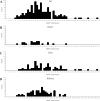Characterization of the stanford integrated psychosocial assessment for transplant for heart, liver, and kidney transplant candidates in Japan
- PMID: 37461076
- PMCID: PMC10353237
- DOI: 10.1186/s13030-023-00281-6
Characterization of the stanford integrated psychosocial assessment for transplant for heart, liver, and kidney transplant candidates in Japan
Abstract
Background: The Stanford Integrated Psychosocial Assessment for Transplantation (SIPAT) is a comprehensive psychosocial assessment proven useful for predicting the outcomes of organ transplantation that is expected to be useful in Japan. However, the characteristics of organ-specific SIPAT scores for organ transplant recipient candidates in Japan are unclear and, to date, the SIPAT has not been properly utilized in clinical practice. The purpose of this study was to present basic data that can be used to establish the relation between SIPAT scores and post-transplantation psychosocial outcomes as well as organ-specific outcomes.
Methods: This study included 167 transplant recipient candidates (25 heart, 71 liver, and 71 kidney) who completed a semi-structured interview based on the Japanese version of SIPAT (SIPAT-J) prior to transplantation. The differences between organs in terms of SIPAT scores and differences in SIPAT scores based on demographic data were comparatively analyzed.
Results: The total SIPAT scores were higher for liver recipient candidates than for heart recipient candidates (P = .019). Regarding the subscales, SIPAT B (social support system) scores were higher for liver and kidney recipient candidates than for heart recipient candidates (P = .021), whereas SIPAT C (psychological stability and psychopathology) scores were higher for liver recipient candidates than for kidney recipient candidates (P = .002). Recipient candidates with a history of psychiatric treatment and those who were unemployed had higher SIPAT scores, regardless of the transplant organ, than recipient candidates without a history of psychiatric treatment and those who were employed (P < .001, P = .016, respectively).
Conclusions: There were notable differences in the total SIPAT-J and subscale scores among the liver, heart, and kidney recipient candidates. Each organ was associated with specific psychosocial issues that should be addressed before transplantation. Interventions such as information provision and patient education based on SIPAT assessment results for each organ may improve recipient post-transplant outcomes.
Keywords: Organ-specific; Post-transplant outcomes; Pre-transplant evaluation; Psychosocial support; Stanford Integrated Psychosocial Assessment for transplantation; Transplant recipient.
© 2023. The Author(s).
Conflict of interest statement
The authors declare that they have no competing interests.
Figures

References
Grants and funding
LinkOut - more resources
Full Text Sources

